Alibi (1929)
DIRECTED BY: Roland West
STARRING: Chester Morris, Harry Stubbs, Mae Busch
NOMINATED FOR: Best Actor in a Leading Role (Chester Morris)
Best Art Direction (William Cameron Menzies)
Best Picture
It's kind of heartwarming to discover that SOMEBODY was trying to use sound artistically this early in it's history. Most sound films at the time were just stationary cameras filming people talking. Sound was just that, sound. A gunshot was a gunshot, a footstep was a footstep, and a scream was a scream. There was very few attempts to bring symbolization into sound this early in the game.
Alibi is a dated, creaky film now, but put into context, and it's pretty amazing. The very opening scene is a montage of simple sounds. A prison guard twirls his baton, creating a beat.

A bell is rung to the same beat.
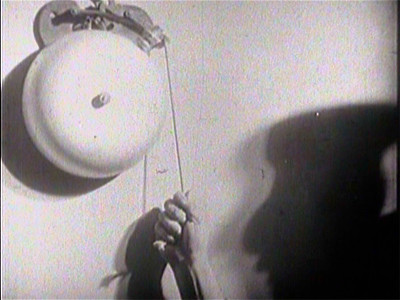
Prisoners drag their feet.

Another prison guard beats his baton against a wall.
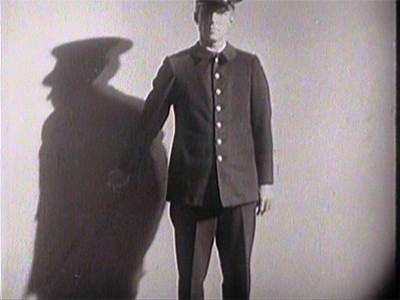
This is the earliest musical moment I've seen in sound pictures. The film is not a musical, but the simple beat and the poetic images suggest the opening moments of a modern music video. Most musicals at that time were simply Broadway performances put in front of a camera, usually involving dancing girls with glittery costumes.
Alibi has those too, though.
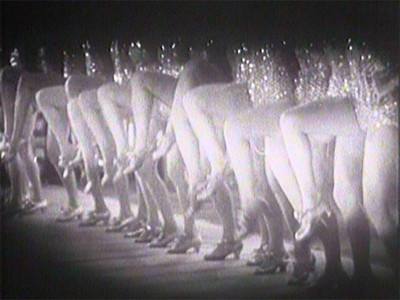
This is the main problem with Alibi, it has split personalities. The film was originally conceived as a silent film, but the success of talkies forced director Roland West to transform it into a sound film.
What we end up with is a film where half the scenes are like the one at the beginning, filmed silent with sound dubbed in later, and the other half falling into the same claptrap of all the other early sound films, with glittery flow-stopping musical numbers and people standing in rooms talking while the camera doesn't move.

The plot is at least interesting, so we have that to get us through the exposition scenes. The film revolves around the relationship between ex-con Chick Williams and the police. For the first half of the film, we learn that the police planted a gun on Chick which resulted in him going to prison. When Chick gets out, he connects with the daughter of the police sergeant that framed him, much to the father's dismay.
If the film has anything to say, it's that, sure, criminals are bad, but the police are not much better. Chick's framing is the big off-screen example of the police's questionable tactics, but that's not enough for us. We have to see these guys do their dirty laundry themselves.

During a heist, a police officer is shot, and the police are going to get answers no matter what. They bring in a two-bit thug and start questioning him, demanding a name out of him even though he claims an alibi.
This scene is my favorite in the entire film. Roland West did a lot of experimenting with sound in the film, and he may have been one of the first directors to discover that with sound comes silence. Silent films never had the luxury of silence, with live music always being played. With a sound film, when the sound goes away, you pay attention, you get tense. So, when a mysterious face appears in a door...

...and one officer goes to stand by the window...
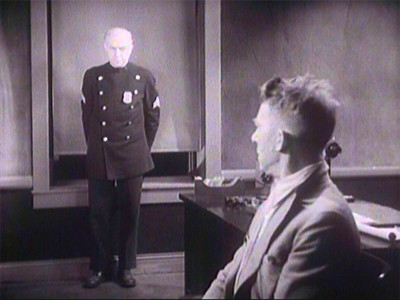
...and the other officer wipes the fingerprints off a gun...
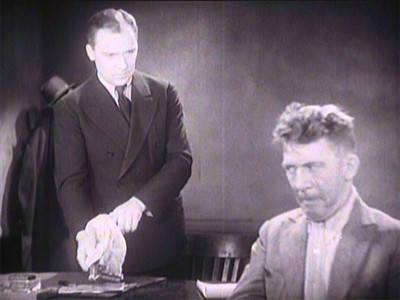
...and there's no sound to explain it all, no sound to comfort you, then your heart really starts to race.
It's amazing how hopeful I get when I see someone trying to regain the artistic freedom lost by technology. As CGI continues to take over films, I hope we get more and more directors who try and implement it in new and artistic ways.
Again, the film is still a mixed bag, and that goes for it's other elements. It was nominated for it's art direction by our old friend William Cameron Menzies. Some descriptions of the film has dubbed it "inspired by German expressionism," but I don't agree. However, the slightly off-beat art deco is something to enjoy.

So while Menzies' production design is a hit, the acting is a big, big miss. It seems most of the actors involved were still suffering from the jitters of converting to silent style to talkie style. Chester Morris, nominated for Best Actor for his role as Chick Williams, always seems like he's trying to squeeze his skull out of his head.

However, the worst offender is Regis Toomey, playing an undercover detective named Danny McGann. His cover? Drunken Wall Street broker.
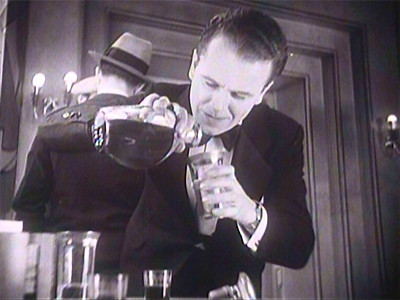
Danny's drunk character is so over the top it's laughable. At first I thought the character of Danny was a bad actor, but when Danny's cover is blown and we see the real character, I realized that it was Regis that was the bad actor. Every scene with Danny is sooooo drawn out and annoying, and it makes sense that his most drawn out and annoying scene is when he dies.

It takes minutes for him to finally go. He tells everyone his regrets, makes his finally wishes, etc., all with twenty second pauses between each line. And finally, right before he dies, UKULELE MUSIC STARTS PLAYING! What is this crap!?!
*sigh* Such is the nature of this film. If you want the good, you got to take the bad. It's certainly the best film from the 2nd Academy Awards I've looked at so far, and in this sea of dead weights, you take what you can get.

No comments:
Post a Comment